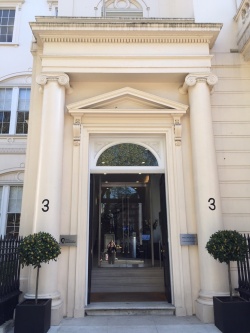Royal Academy of Engineering
The Royal Academy of Engineering is a pro-nuclear British body that claims to "lead debate by guiding informed thinking and influencing public policy."[1] Established in 1976, the body is registered as a charity (No. 293074).
Contents
Conflicts and criticisms
Pro-nuclear lobbying
According to The Times, "[r]eports from the Royal Academy of Engineers and the Institution of Civil Engineers have told ministers that they will have to approve new nuclear power stations to guarantee future supplies." Its president, Sir Alec Broers, who is also the former Vice-Chancellor of Cambridge University, has called nuclear energy critical for Britain's future.[2] In response to the Cabinet Office's 2002 Energy Review, the body published a report calling the government's interest in renewable energy "hopelessly unrealistic". Ian Fells, a member of the body, called the energy policy's aims "laudable" but declared them "largely wishful thinking".[3][4]
In 2004, the body issued a report entitled 'The Cost of Generating Electricity',[5] which downplayed the costs of Nuclear power while exaggerating that of renewable energy.[6] In a Letter to the Editor of The Independent, Chief Executive Philip Greenish criticized the "Government's faith in wind power" calling it "unrealistic". He expressed support for The House of Lords Science and Technology Committee's criticism of the Government's energy policy and claimed that "electricity from off-shore wind farms could be significantly more expensive than that from conventional energy sources".[7] Its worth noting that the Chair of The House of Lords Science and Technology Committee is none other than Lord Alec Broers, the President of The Royal Academy of Engineering.
In an op-ed in the Financial Times, Alec Broers argued for the reopening of the nuclear option "without delay". He claimed that nuclear energy is "significantly cheaper than wind or wave power".[8]
PR
According to PR Week, in 2005, RAE commissioned the services of Politics Direct to provide "parliamentary support and ensure the profession is well represented on the policy agenda".[9]
In 2009 Brevia Consulting represented the RAE.
Affiliations
Supported organisations
- The Royal Academy of Engineering is a funder of the Science Media Centre.[10][11]
People
- Sir John Parker, President
- Alec Broers, Former President
- Lord Browne, Former President until 2011, later chairman of fracking firm Cuadrilla Resources
- Philip Greenish, Chief executive
- The Duke of Edinburgh is one of its senior fellows and the Duke of Kent is a Royal Fellow. *Its former chief executive was Jon Burch.
Funding
Publications

|
This article is part of the Spinwatch Fracking Portal and project |
- 'Shale gas extraction in the UK: a review of hydraulic fracturing', Royal Academy of Engineering and The Royal Society, June 2012
Contact
- Address:
- Prince Philip House
- 3 Carlton House Terrace
- London
- SW1Y 5DG
- Tel: 020 7766 0600
- Fax: 020 7930 1549
Related links
- Mark Henderson, "Nuclear power 'is critical to Britain's future'," The Times 18 Aug 2003.
- Mark Henderson, "Renewable energy policy is unrealistic, say engineers", The Times 30 Aug 2002.
- Ben Richardson, "Nuclear power's cost conundrum," BBC News 23 Nov 2005.
- PB Power, 'The Cost of Generating Electricity,' Royal Academy of Engineering 2004.
- Alec Broers, "Britain must act quickly on nuclear energy," The Financial Times 18 May 2005.
Notes
- ↑ RAEng, An event to celebrate the 50th Anniversary of the first working laser and the award of the 2009 Nobel Prize to Professor Charles Kao CBE FREng FRS, Jul 2012, accessed 30 Oct 2013.
- ↑ The Times, "Nuclear power 'is critical to Britain's future': Renewable power will not stop global warming or blackouts," World Nuclear Association website, 18 Aug 2013, accessed 30 Oct 2013.
- ↑ Mark Henderson, "Renewable energy policy is unrealistic, say engineers," The Times 30 Aug 2002, retrieved from Yahoo Groups website, accessed 30 Oct 2013.
- ↑ Renew On Line, "Energy Review: White Paper," Issue 41, Jan-Feb 2003, accessed 30 Oct 2013.
- ↑ RAEng, The Cost of Generating Electricity, Mar 2004, accessed 30 Oct 2013.
- ↑ Ben Richardson, "Nuclear power's cost conundrum," BBC News 23 Nov 2005, accessed 30 Oct 2013.
- ↑ The Independent, "Pets, blair and others," 'Wind energy': Philip Greenish's reply, 19 Jul 2004, accessed 30 Oct 2013.
- ↑ Alec Broers, "Britain must act quickly on nuclear energy," The Financial Times 18 May 2005, accessed 30 Oct 2013.
- ↑ PR Week, "Public Affairs: Engineering brief for Politics Direct," 10 Jun 2005, accessed 30 Oct 2013.
- ↑ SMC, SMC Annual Review 2007, accessed 30 Oct 2013.
- ↑ SMC, Funding, accessed 30 Oct 2013.
